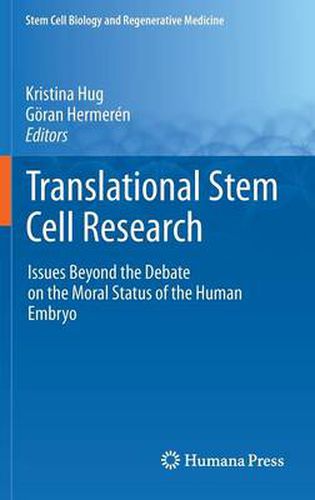Readings Newsletter
Become a Readings Member to make your shopping experience even easier.
Sign in or sign up for free!
You’re not far away from qualifying for FREE standard shipping within Australia
You’ve qualified for FREE standard shipping within Australia
The cart is loading…






This title is printed to order. This book may have been self-published. If so, we cannot guarantee the quality of the content. In the main most books will have gone through the editing process however some may not. We therefore suggest that you be aware of this before ordering this book. If in doubt check either the author or publisher’s details as we are unable to accept any returns unless they are faulty. Please contact us if you have any questions.
For many years, the ethical discussion surrounding human embryonic stem cell research has focused on the moral status of the embryo. This text takes a wider moral berth and focuses on numerous ethical, legal and social aspects involved in translating the results of stem cell research into diagnostic and therapeutic applications.
Translational Stem Cell Research is broken into ten sections. It opens with an overview of the latest in stem cell research, focusing on specific diseases and the treatment of burn victims. Part II discusses the issues involved in the many steps from bench to bedside, ranging from first research in vitro to clinical trials. Part III covers scientific, regulatory and ethical challenges to basic research, and Part IV details issues regarding stem cell banks. Part V explores ethical, economic and strategic issues involved in collaboration between universities and industry, and Part VI addresses legal problems raised by patents on human stem-cell based inventions plus the extent to which there can be technological solutions to a moral dilemma. Part VII presents imaginative ways of communicating research to the general public and how to create conditions for a constructive dialogue. Part VIII probes psychosocial and cultural factors affecting judgment and decisions about translational stem cell research, and Part IX explores problems and procedures raised by an examination of the evaluation of stem cell research projects in research ethics committees. The book closes with a look into the future of translational stem cell research and stem cell-based therapeutic applications.
$9.00 standard shipping within Australia
FREE standard shipping within Australia for orders over $100.00
Express & International shipping calculated at checkout
This title is printed to order. This book may have been self-published. If so, we cannot guarantee the quality of the content. In the main most books will have gone through the editing process however some may not. We therefore suggest that you be aware of this before ordering this book. If in doubt check either the author or publisher’s details as we are unable to accept any returns unless they are faulty. Please contact us if you have any questions.
For many years, the ethical discussion surrounding human embryonic stem cell research has focused on the moral status of the embryo. This text takes a wider moral berth and focuses on numerous ethical, legal and social aspects involved in translating the results of stem cell research into diagnostic and therapeutic applications.
Translational Stem Cell Research is broken into ten sections. It opens with an overview of the latest in stem cell research, focusing on specific diseases and the treatment of burn victims. Part II discusses the issues involved in the many steps from bench to bedside, ranging from first research in vitro to clinical trials. Part III covers scientific, regulatory and ethical challenges to basic research, and Part IV details issues regarding stem cell banks. Part V explores ethical, economic and strategic issues involved in collaboration between universities and industry, and Part VI addresses legal problems raised by patents on human stem-cell based inventions plus the extent to which there can be technological solutions to a moral dilemma. Part VII presents imaginative ways of communicating research to the general public and how to create conditions for a constructive dialogue. Part VIII probes psychosocial and cultural factors affecting judgment and decisions about translational stem cell research, and Part IX explores problems and procedures raised by an examination of the evaluation of stem cell research projects in research ethics committees. The book closes with a look into the future of translational stem cell research and stem cell-based therapeutic applications.